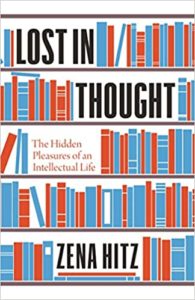On our sister website Law & Liberty, Jennifer Frey (U. of South Carolina) has a remarkable review of what seems to be a remarkable book by Zena Hitz. With Hitz, Frey defends the “monkish virtues”—and liberal arts—that David Hume attacked in the name of utility and economics. Monks, however, should also learn some economics.

The reviewed book (which I have not read) is Zena Hitz’s Lost in Thought: The Hidden Pleasures of an Intellectual Life (Princeton University Press, 2020). Every economist should read Frey’s review, a vibrant defense of the “solitude of contemplative life.” A couple of excerpts from Frey:
… the compelling case that the cultivation of our inner lives, which requires many of the monkish virtues that Hume dismissed, is fundamental to authentic human flourishing.
Hitz found herself increasingly alienated from academic life, which had trained her to fear rejection and prize prestige and status far more than it had cultivated her thrill for learning or her love for truth.
It is central to Hitz’s argument that love of learning is intrinsically, rather than instrumentally, valuable.
But leisure and contemplation are not, on Hitz’s vision, reserved for an elite, leisured class with a special kind of elite training or pedigree.
[Hitz] writes of Malcolm X, who discovered a love of learning while imprisoned as a young man.
We can either stay skimming along the surfaces of our lives, lost in the thrall of spectacles, the ambitious drive for status and prestige, and the satisfactions of the flesh, or we can choose to be serious and plunge ourselves into the depths of reality, an activity which calls us out of ourselves and demands a kind of faithful obedience to the task of understanding it more completely.
Her discussion of Dorothy Day—one of the highlights of the book—underscores the deep and important connections between solitude, silence, and solidarity.
I would argue that the flesh should be celebrated too and reconciled with monkish virtues, although I am not totally sure how the reconciliation can be done.
I would also challenge Dorothy Day’s simplistic social and political thought—like Catholic “social” teaching in general—which would strongly benefit from some economics. Individuals have different preferences, resources are scarce relative to human desires, incentives matter, the “common good” is not easy to define, the philosophers’ “highest good” is even more ambiguous, the “we” is a collection of “I”s, and Day’s anarchist ideal cannot abolish these realities.


READER COMMENTS
Thomas Hutcheson
Jul 5 2020 at 8:04am
Theological/philosophical concerns are about the form of the utility function one seeks to maximize, along with any relevant constraints. Given that, making MC=MR is still appropriate.
AJ
Jul 6 2020 at 9:22am
Don’t utility functions presuppose the correctness of utilitarian philosophy? So would it even make sense to cycle through philosophical concerns – which would be prior to utility functions – through utility functions themselves to maximize utility?
Pierre Lemieux
Jul 6 2020 at 10:11am
@AJ: In the neo-classical perspective (following John Hicks and Paul Samuelson), a utility function simply gives a ranking of all possible baskets of goods in an individual’s preferences. It can have any shape but must respect the transitivity axiom: if A is preferred to B, and B to C, then A is preferred to C (A, B, and C being baskets of goods). If states of the world (different baskets of goods) are arguments in a utility function, an individual philosophy is part of his utility function. In this perspective, philosophical values are not prior to utility functions.
As for utilitarianism (at least act utilitarianism, as opposed to rule utilitarianism), it is a philosophy that compares utility among individuals, which is arbitrary. An individual may prefer this philosophy to others, but another one may have other preferences.
Again in this perspective, there appears to be no philosophical good above the preferences of individuals.
AJ
Jul 6 2020 at 11:48am
I guess what I’m trying to understand is that utility theory itself presupposes utilitarianism. So if I’m trying to assess whether or not I prefer that philosophy to another by comparing their utilities, wouldn’t that be a vacuous assessment? What would happen if I prefer another philosophy to utilitarianism. What would that say about utility functions themselves?
I’m not asking trick questions but just trying to understand how Thomas’ comment makes sense.
Or am I missing something?
Pierre Lemieux
Jul 6 2020 at 3:37pm
AJ: As I tried to explain, a utility function (which is a positive concept) does not imply utilitarianism (which is a normative concept). For example, both James Buchanan and Anthony de Jasay use utility functions, which is essential in economics, but are not utilitarians.
AJ
Jul 7 2020 at 9:27am
Thanks – I see your reply and that makes a little more sense. I would still argue, though, that a positive concept like utility functions does presuppose axioms founded on normative or metaphysical concepts, which themselves cannot be subject to MB = MC calculations.
My overall point is that the normative concepts (e.g. philosophical inquiry) occur prior to utility functions, so it doesn’t make sense to try to include them as arguments into that function or its form.
Pierre Lemieux
Jul 6 2020 at 11:34am
@Thomas Hutcheson: You may be right in terms of moral philosophy. The moral question would then be, What are the constraints that I wish to impose on my utility function or that I think that others should impose on their utility functions? (I might also say that these moral preferences are arguments in my utility function.) In political philosophy, the question is more complicated because one is also assuming that the greater good, if it exists over and above individual preferences, should be imposed on those who disagree.
AJ
Jul 5 2020 at 1:41pm
Can you expand on this? Why do you think the flesh can be reconciled with the monkish virtues as you understand it?
Pierre Lemieux
Jul 6 2020 at 10:22am
Some individuals prefer monkish virtues, others (most of the others) the flesh. The former cannot survive without the latter (to study and contemplate, it’s useful to have somebody who mans the presses). Moreover, it seems to me that an individual may very well like both contemplation and the flesh, and there are different possible combinations. Look at Michelangelo’s paintings.
Comments are closed.